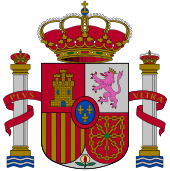This article is missing information about pre-1812 law, treatment of people in the Spanish Empire, and evolution from feudal allegiances. (June 2024) |
| Spanish Citizenship Act | |
|---|---|
 | |
| Cortes Generales | |
| |
| Territorial extent | Spain |
| Enacted by | Government of Spain |
| Enacted | [when?] |
| Status: Current legislation | |
The Spanish nationality legal framework refers to all the laws, provisions, regulations, and resolutions in Spain concerning nationality.
Article 11 of the First Title of the Spanish Constitution refers to Spanish nationality and establishes that a separate law is to regulate how it is acquired and lost.[1] Lacking an overarching unifying legal body, the current regulation about nationality in Spain is thus contained in 17–28th articles of the Civil Code, 63–68th articles of the Civil Registry Law, 220–237th articles of the Civil Registry Regulations and in a number of instructions and resolutions from the Directorate General for Registers and Notaries.[2]
Spanish citizenship by origin is defined in the Civil Code on the principle of jus sanguinis (with some limited jus soli provisions) and it can be voluntarily renounced but not forcefully removed.[3] The most common mode of acquisition of derivative citizenship is legal and continuous residence in the country.[4] The Spanish legal framework is considered to be one of the most restrictive in Europe in terms of citizenship acquisition.[5] A preferential treatment in this regard is granted to former colonies, whose citizens also enjoy the privilege of not needing to renounce their original citizenship to acquire the Spanish one.[6]
- ^ "Título I. De los derechos y deberes fundamentales - Constitución Española". 5 April 2010. Archived from the original on 5 April 2010. Retrieved 10 July 2015.
- ^ Viñas Farré 2009, p. 279.
- ^ Finotelli, Claudia; La Barbera, Maria Caterina (2013). "When the exception becomes the rule: The Spanish citizenship regime" (PDF). Migration Letters. 10 (2). CSIC Press: 246. doi:10.33182/ml.v10i2.146. hdl:10261/258339. ISSN 1741-8984.
- ^ Finotelli & La Barbera 2013, p. 246.
- ^ Finotelli & La Barbera 2013, p. 245.
- ^ Finotelli & La Barbera 2013, pp. 247–252.